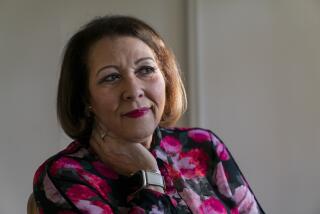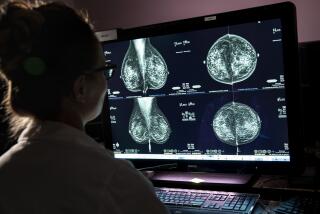Mammogram Advised for Women in 40s : Study Finds Fewer Breast Cancer Deaths With Regular Checkups
- Share via
WASHINGTON — Routine screening by mammography “significantly reduces breast cancer deaths” among women between 40 and 49, a finding that reinforces the argument that women in that age group should undergo the procedure at least once every two years, according to a report released Tuesday by the National Cancer Institute.
Major cancer organizations--including the institute, the American Cancer Society and the American College of Radiology--have recommended that women in their forties have mammograms every one to two years and that women older than 50 have such checkups annually, but some experts have maintained that a blanket recommendation of frequent mammograms is unnecessary for the younger women.
“Perhaps the new data will encourage those people who do not currently advocate mammography for women under 50 to reassess their position,” said Kenneth Chu, one of the researchers involved in the study.
Cancer Fatalities Cut
The study, based on data from a clinical trial conducted by the Health Insurance Plan of Greater New York, found 24% fewer breast cancer deaths among women who were screened between ages 40 and 49 than in a control group of women in that age group who did not undergo mammography. The research also found 21% fewer breast cancer deaths among women between 50 and 64 who had the screenings. In the study, 742 women in both the younger and older age groups were followed for a minimum of 18 years.
The scientists said that previous analyses of the same data had already shown that use of mammograms resulted in a significant reduction in the rate of breast cancer deaths in the older group, but that extended follow-ups and improved statistical methods had confirmed similar findings in the younger group as well.
“Length of follow-up is probably a key factor in seeing mortality reduction in women 40 to 49,” said Dr. Charles Smart, head of the institute’s early detection branch and co-author of the report.
Low-Radiation X-Ray
Mammogram, which is painless, is an X-ray of the soft tissues of the breast. It is capable of detecting tumors too small to be felt by hand. The amount of radiation used in the screening “has decreased to a point of negligible risk,” Smart said. Fees for the procedure range from about $25 to more than $200.
Advocates of early and routine use of mammograms applauded the new findings.
“In terms of saving lives, is there a survival benefit (in mammograms) for women under 50? The answer is ‘yes’ ” said Dr. Marc Lippman, director of the Vincent Lombardi Cancer Center at Georgetown University and former head of the breast cancer program at the National Cancer Institute. “Mammograms are for what you cannot feel. A mammogram overwhelmingly detects the cancers that are there to be detected.”
Dr. Vicki Seltzer, a New York gynecologist and author of a book on breast cancer, agreed. “In my patients, I’ve seen so many tiny breast cancers picked up by mammograms in that age group that I definitely believe it is absolutely useful for women between 40 and 49,” she said.
Some Doctors Disagree
Those who have argued against routine screening for all women in their forties say that such widespread examinations are not cost-effective for women in that age group, who are less prone to breast cancer than older women, and may result in a false sense of reassurance in the event of a false negative result. Further, they say, mammograms often detect abnormalities that are wrongly diagnosed as malignancies.
“Women have biopsies and even mastectomies for perfectly benign diseases,” said Dr. John C. Bailar III, a professor in the department of epidemiology and biostatistics at McGill University School of Medicine in Montreal. “I believe there is good evidence that mammography picks up countless abnormalities that the pathologists have never seen before, and they are calling these things cancer--because everyone involved wants to be safe, rather than sorry.”
He said that he recommends an annual mammogram for women older than 50, and for a younger woman only if she “already had a confirmed breast cancer, or if she has had a mother or sister with breast cancer.”
Chu said that while other breast cancer research has focused on the number of breast cancer deaths in a total study population, the institute’s research analyzed breast cancer deaths only a1836019303was “a more powerful test.”






